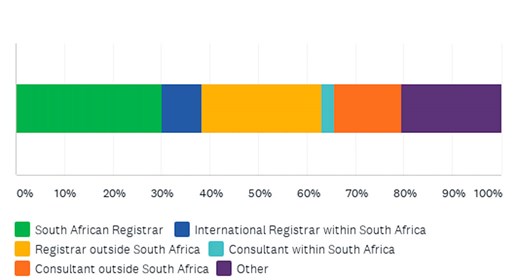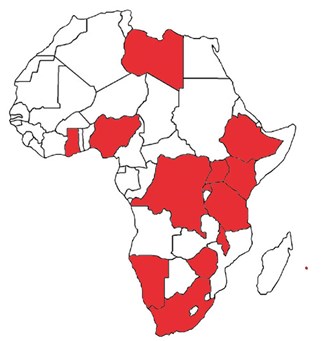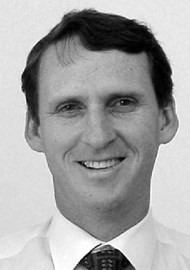The COVID-19 pandemic has been a global catastrophe with far-reaching consequences felt across many fronts around the world. One such aspect is the training of the future generation of ENT surgeons. With routine elective activity curtailed, academic conferences cancelled, and training programmes modified, the future appeared bleak. In response to that, online activity has brightened the horizon of ENT training with webinars, lectures and tutorials held virtually. This article is a clear demonstration of ENT trainee resilience and innovation as it describes a novel international training teleconference programme spanning the continent of Africa.
The SARS-CoV-2 virus has changed, seemingly overnight, the lens of our eyes but also practically, the grain of our homes, working environments and learning institutions. It has challenged each of us to understand the fragility within ourselves but to also witness the flawed assumption of daily routine. In these unique times, we are building towards adaptation.
However, often surprisingly, certain adaptations become progressions that implore our energy to dare to question the pre-pandemic normality we thought so necessary. Videoconferencing towards academic pursuit may represent a defiance that will alter how we learn, collaborate and meet, forever.
The COVID -19 pandemic has caused unprecedented disruption of specialist training globally. There has been a dramatic reduction in elective surgery and outpatient services [1] and social distancing practices have eliminated physical academic meetings and teaching ward rounds. This has tested traditional experiential learning to the core. Staff redeployment to COVID-related duty further threatens teaching and training norms. Training programmes globally are tasked with the responsibility to maintain the sacred tripartite mission of research, education and clinical care [2]; there may be no better time to re-imagine ‘new normals’.
“It has paved the way for innovative collaborative learning and begs us to reimagine a future with fewer institutional fences and more collaborative bridges”
The Division of Otolaryngology (ENT) at the University of Cape Town (UCT) is a small department made up of only 15 members, which, prior to the COVID-19 era, maintained its strong ethos for excellence through biweekly academic meetings augmented by ward-round and patient-based learning. In order to adapt to the COVID-related challenges, we adopted Zoom videoconferencing for our academic presentations and introduced virtual academic ward rounds. It is a registrar-driven initiative that aimed to maintain learning amidst exceptional and strenuous times.
Recognising the commonality of current circumstances with the suspension of many training programmes, we went a step further by establishing a new online academic programme coined ‘UCT-Africa Virtual ENT’, which provided open access to our academic presentations and virtual academic ward rounds to all ENT departments in South Africa. With an overwhelming response and positive feedback, this initiative was expanded to the rest of Africa. The aims of UCT-Africa Virtual ENT have been simple: to cut across academic silos so typical of centres of academic learning, to promote institutional collaboration, and to maintain educational goals during this tumultuous time whilst daring to reimagine novel ways for learning, long term.

Figure 1. Attendees and geographical locations.
Since the establishment of UCT-Africa Virtual ENT in April 2020, 175 different participants including medical officers, registrars, fellows and consultants (Figure 1), have joined our twice-weekly virtual academic meetings and academic ward rounds, with an average of 80 participants per meeting. It has been exceptionally rewarding to hear trainees from other institutions give presentations, pose questions, and participate actively in discussions. This has almost immediately created a sense of common purpose across Africa despite being separated by distance and institutional barriers. Patients’ confidentiality is maintained, and patients consent to the public sharing of photographs and clinical details on the platform. Zoom was selected as its limited bandwidth makes it suitable for countries with limited internet capacity.
A survey was conducted to assess the value of UCT-Africa Virtual ENT, as well as how to improve it. There were 73 respondents. The survey revealed that all eight South African ENT training centres had participated. Trainees from other African countries made up 46% of attendees and countries represented included: Zimbabwe, Ethiopia, Ghana, Tanzania, Uganda, Kenya, Malawi, Libya, Democratic Republic of Congo, Rwanda, Nigeria, Mauritius and Namibia (Figure 2) as well as the UK, Switzerland and Canada.

Figure 2. African countries participating in UCT-Africa Virtual ENT.
Over 90% of respondents stated that their training had been compromised by the COVID-19 pandemic, and 97% found learning on a virtual platform beneficial. Participants accessed the meetings using various devices, with 84% using their personal data. The ease and convenience of access was further demonstrated with attendees logging in from their personal residences, hospitals, university libraries and even from their cars. Eighty-seven percent stated they would like to contribute academic material to the meetings, and the meetings have seen at least one trainee outside UCT present a case every week since the platform’s inception.
The multitude of different practices expressed at meetings has proven to be a cue for positive engagement and learning. Almost all respondents felt that such cross-institutional collaboration enhanced their learning, with nearly 90% agreeing that cross-institutional virtual academic meetings should be formally incorporated into their training programmes. In response to the request from trainees with different time zones and schedules, the decision to upload recordings of sessions on a free public platform was undertaken. UCT-Africa Virtual ENT now has a YouTube channel that can be accessed by the following link: UCT-Africa virtual ENT YouTube Channel: https://cutt.ly/XfqgLIK
Interestingly, 67% of survey respondents noted that virtual platforms such as UCT-Africa Virtual ENT had the potential to replace physical meetings and conferences. More than 97% agreed that this platform would be sustainable post-pandemic. Overall, the Wednesday formal academic presentations received a 4.3/5 star-rating, and the Friday case-based ‘virtual ward rounds’ received a 4.5/5 star-rating. All respondents stated that the virtual meetings were ‘very valuable’ or ‘extremely valuable’ to their training.
UCT-Africa Virtual ENT has demonstrated how virtual academic meetings and teaching ward rounds provide an opportunity to transcend traditional educational barriers and to promote free access to learning and interinstitutional collaboration across Africa and beyond. Despite national divides, trainees in Africa often have similar circumstances. They share similar patient profiles, disease patterns and, quite importantly, available resources and infrastructural conundrums. While receiving information through webinars and guidelines from more developed centres has value, the importance of discussing practicalities on the ground by healthcare practitioners within the same continent is immeasurable. An inexpensive, convenient and fast way to hold academic meetings can make great strides to this end and is especially needed in the context of our continent.
Looking into the future, the way that we see scientific learning and networking through professional conferences may change drastically. Platforms such as ours have the potential to save huge costs whilst maintaining the aims of congregational learning and presentations. Trainees from one institution may in the future consistently benefit from subspecialties more advanced in other institutions and vice versa, potentially negating the need for many departments to roster in external electives.
Overall, we believe this unprecedented time has presented itself with thoughts and opportunities that otherwise may never have been considered. It has paved the way for innovative collaborative learning and begs us to reimagine a future with fewer institutional fences and more collaborative bridges.
References
1. Crosby DL, Sharma A. Insights on Otolaryngology Residency Training during the COVID -19 Pandemic. Otolaryngology Head & Neck Surgery 2020.
2. Standiford T, Shumaan AG, Fessell D, et al. Upholding the tripartite mission in times of crisis: Purpose and perseverance in the COVID-19 Pandemic. Otolaryngology Head & Neck Surgery 2020.






